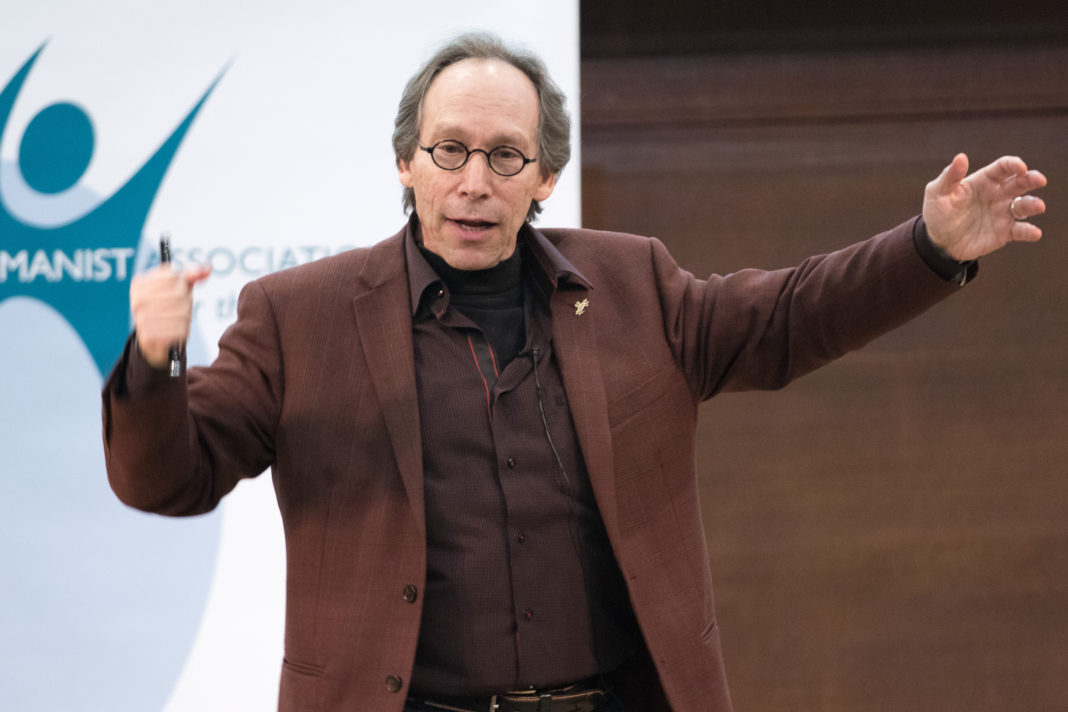
Theoretical physicist Professor Lawrence Krauss wowed an audience of close to 2,000 people over two nights as part of a series of events celebrating Darwin Day from the British Humanist Association (BHA). Titled ‘Cosmic natural selection’, Krauss’s Darwin Day Lecture marked fifteen years of BHA lectures commemorating the life and work of Charles Darwin, and was as per tradition chaired by BHA patron Professor Richard Dawkins. Krauss, the first physicist to give the Darwin Day Lecture, was a fitting choice because his work, much like Darwin’s, has helped us to uncover dramatic truths about our world, said Professor Dawkins: ‘Even more dramatically than Darwin, Lawrence Krauss has shown us that a universe can indeed spring from nothing.’
Lawrence’s lecture unpicked creationist arguments for the fine-tuning of the universe, and he took his audience on a tour of the history of physics and our rapid advances in our understanding of the underlying nature of our universe, from Galileo to Michael Faraday, James Maxwell, Albert Einstein, Richard Feynman, and Peter Higgs, with his narrative culminating in the 2013 discovery of the Higgs boson at the Large Hadron Collider in Geneva, which seemingly proves Peter Higgs’ postulation of a field throughout the universe that can account for the massiveness of elementary particles.
The strength of Krauss’s lecture was his captivating presentation of a history of scientific discovery and innovation in narrative form, emphasising the twists and unexpected turns that science has taken as humanity has expanded its understanding of the universe. The greatest scientific advances, he explained, consisted not of redrawing our understanding of physics, but in reconciling those seemingly irreconcilable truths proven by earlier experiments, as Einstein did with his theory of relativity, and as Faraday and Maxwell did with electromagnetism. ‘The sign of progress in science is when things that appear to be different turn out to be the same under the surface,’ said Krauss.
With the Higgs boson further cementing the standard model of particle physics, we can be even more confident that our existence is a matter of chance, and that ‘the universe is not fine-tuned to our existence. We are fine-tuned to exist in the universe,’ said Krauss. He concluded on a note of wonder and appreciation for the grand cosmic accident of our existence: ‘Don’t be scared of living in a universe that doesn’t give a damn about you,’ he said, ‘and instead, enjoy your brief time in the sun.’
Notes
The British Humanist Association (BHA) is the national charity working on behalf of non-religious people who seek to live ethical and fulfilling lives on the basis of reason and humanity.
The Darwin Day Lecture, held each February as part of the British Humanist Association’s annual lecture series, explores Humanism and humanist thought, especially that related to science and evolution, Charles Darwin, and his works. It takes place every year on or around 12 February, coinciding with Darwin Day, the annual global celebration of the birth of Charles Darwin.
It is part of the BHA’s annual lecture series, which also includes the Rosalind Franklin, Voltaire, Holyoake, and Bentham Lectures.
